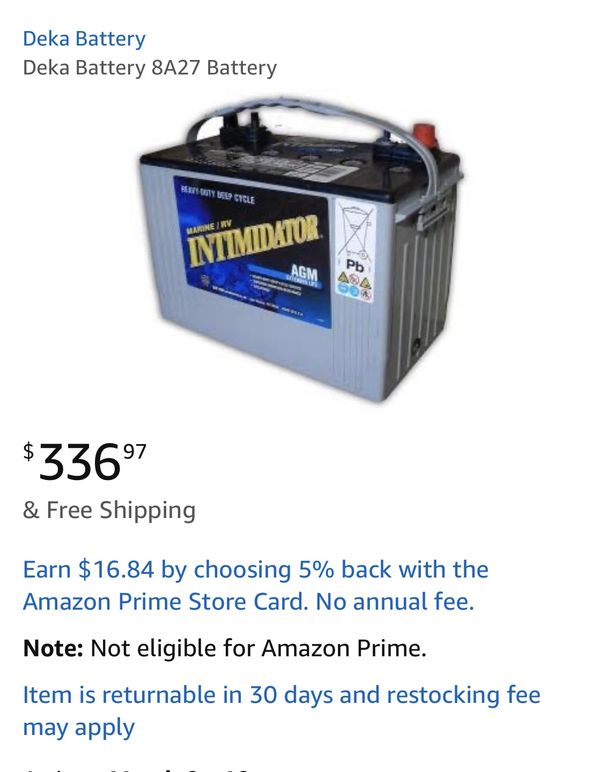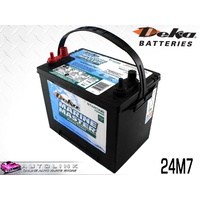


With new Deka battery products released to market every year, East Penn is happy to continue on the Deka brand name today, more than seven decades after it was founded. Top Post Right Front Positive Terminal, Deka Gold 12-Volt 650 CCA Automotive Battery Who owns Deka battery? Does Deka make lithium ion batteries?Ī high-intensity Lithium-ion battery that’s engineered to last, maintenance-free, and supported by East Penn Manufacturing.
#Deka marine batteries dealers free
(referred to as “Deka”) guarantees batteries with nine (9) or more plates per cell to be free of defects in workmanship and materials for 36 months from the date of invoicing.

What is the warranty on Deka batteries?Įast Penn Manufacturing Company, Inc. Wal-Mart and AutoZone both use Johnson Controls batteries. Johnson Controls manufactures car, truck, and marine batteries, accounting for 65 percent of all automotive, truck, and marine batteries sold in the United States. The origin of Interstate Batteries’ production technique is unknown. Related Questions and Answers Who makes batteries for interstate? In Wujiang, the batteries are built, loaded with acid, activated, and completed. Plastic containers and sulphuric acid are imported from China. People also ask, Are Deka batteries made in China?įully formed plates, separators, terminals, and other components are imported from the United States and assembled in China for Deka Unigy II 2-volt devices. These brands assist us in positioning our goods in order to improve customer awareness and application differentiation. created East Penn in 1946, and it rapidly became one of America’s most regarded manufacturers.ĭeka, Duracell, and BassProShop Batteries are all produced by EAST PEEN, with the identical specifications, prices, and labels, so you’re effectively paying for the brand on the label.Īlso, Does East Penn make Deka batteries?Įast Penn’s Transportation business sells a variety of Deka sub-brands as well as other well-known national brands. East Penn is the company that makes them. East Penn DEKA’s MK Battery is a completely owned subsidiary.Īlso, it is asked, Are Napa batteries made by Deka?ĭEKA has been producing Napa batteries since 2009.
#Deka marine batteries dealers pro
We’re not implying that you would use your boat when the temperature is 0☏.Similarly, What brand batteries are made by Deka?ĭ-Series, Dominator, ETX Sports Power, Fahrenheit, Gold, HydraSaver, Intimidator, Marine Master, MaxPower, Outdoorsman, Precision Built, Pro Master, Solar, Ultimate, UltraBattery, and Unigy are among Deka’s premium brands. Note: The temperatures mentioned above in regard to CCA and MCA are used to standardize the measurement. Marine Cranking Amps (MCA) are identical in concept to CCA, except that they are measured at 32☏, which makes the numbers higher. What this means to boat owners is that large engines, especially diesels and high compression gas engines require a high CCA rating. Technically, this is the number of amps a battery can deliver at 0☏ for 30 seconds without having the voltage drop below 7.2 volts. The term “Cold Cranking Amps” is used to quantify a battery’s ability to crank over an engine. A battery’s group number does not imply purpose, capacity, quality or other characteristics. Battery group numbers denote the size of the case, location of the battery terminals and general configuration. Just like the batteries used to power flashlights or drum-beating pink rabbits (D, C, AA, etc.), boat batteries come in standard sizes designated by their Group number. Your choice of battery chemistries should be based on the performance you desire balanced against how much you are willing to spend. Battery ChemistriesĮach of the battery types mentioned above is offered with a choice of battery chemistries, which are flooded lead acid, gel, AGM (Absorbed Glass Matt) and most recently, Lithium Iron Phosphate, such as those supplied to us by Relion. Dual-purpose batteries can be used for starting engines or powering house loads. Batteries designed for running loads are called house or deep cycle batteries. Those designed for starting engines are called cranking or starting batteries. There are three types of boat batteries: Starting batteries, deep cycle batteries and dual-purpose batteries. When boats have charging devices like alternators, solar panels or wind generators, batteries store electricity so charging devices don’t have to operate simultaneously with items that require electricity. Marine batteries store electrical energy so electrical loads like lights, motors and pumps can operate.


 0 kommentar(er)
0 kommentar(er)
